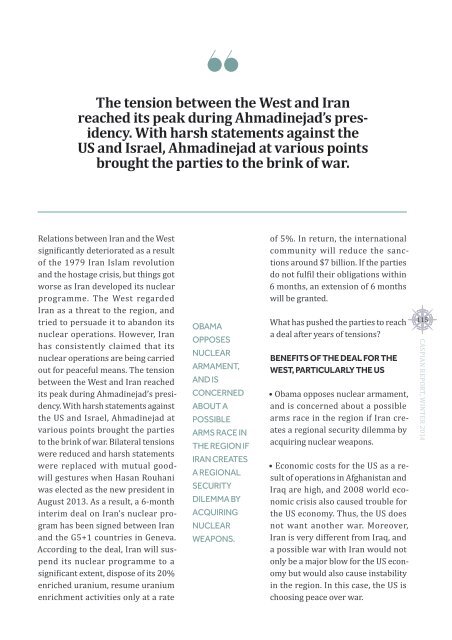Caspian Report - Issue 06 - Winter 2014
Create successful ePaper yourself
Turn your PDF publications into a flip-book with our unique Google optimized e-Paper software.
The tension between the West and Iran<br />
reached its peak during Ahmadinejad’s presidency.<br />
With harsh statements against the<br />
US and Israel, Ahmadinejad at various points<br />
brought the parties to the brink of war.<br />
Relations between Iran and the West<br />
significantly deteriorated as a result<br />
of the 1979 Iran Islam revolution<br />
and the hostage crisis, but things got<br />
worse as Iran developed its nuclear<br />
programme. The West regarded<br />
Iran as a threat to the region, and<br />
tried to persuade it to abandon its<br />
nuclear operations. However, Iran<br />
has consistently claimed that its<br />
nuclear operations are being carried<br />
out for peaceful means. The tension<br />
between the West and Iran reached<br />
its peak during Ahmadinejad’s presidency.<br />
With harsh statements against<br />
the US and Israel, Ahmadinejad at<br />
various points brought the parties<br />
to the brink of war. Bilateral tensions<br />
were reduced and harsh statements<br />
were replaced with mutual goodwill<br />
gestures when Hasan Rouhani<br />
was elected as the new president in<br />
August 2013. As a result, a 6-month<br />
interim deal on Iran’s nuclear program<br />
has been signed between Iran<br />
and the G5+1 countries in Geneva.<br />
According to the deal, Iran will suspend<br />
its nuclear programme to a<br />
significant extent, dispose of its 20%<br />
enriched uranium, resume uranium<br />
enrichment activities only at a rate<br />
OBAMA<br />
OPPOSES<br />
NUCLEAR<br />
ARMAMENT,<br />
AND IS<br />
CONCERNED<br />
ABOUT A<br />
POSSIBLE<br />
ARMS RACE IN<br />
THE REGION IF<br />
IRAN CREATES<br />
A REGIONAL<br />
SECURITY<br />
DILEMMA BY<br />
ACQUIRING<br />
NUCLEAR<br />
WEAPONS.<br />
of 5%. In return, the international<br />
community will reduce the sanctions<br />
around $7 billion. If the parties<br />
do not fulfil their obligations within<br />
6 months, an extension of 6 months<br />
will be granted.<br />
What has pushed the parties to reach<br />
a deal after years of tensions<br />
BENEFITS OF THE DEAL FOR THE<br />
WEST, PARTICULARLY THE US<br />
• Obama opposes nuclear armament,<br />
and is concerned about a possible<br />
arms race in the region if Iran creates<br />
a regional security dilemma by<br />
acquiring nuclear weapons.<br />
• Economic costs for the US as a result<br />
of operations in Afghanistan and<br />
Iraq are high, and 2008 world economic<br />
crisis also caused trouble for<br />
the US economy. Thus, the US does<br />
not want another war. Moreover,<br />
Iran is very different from Iraq, and<br />
a possible war with Iran would not<br />
only be a major blow for the US economy<br />
but would also cause instability<br />
in the region. In this case, the US is<br />
choosing peace over war.<br />
115<br />
CASPIAN REPORT, WINTER <strong>2014</strong>










